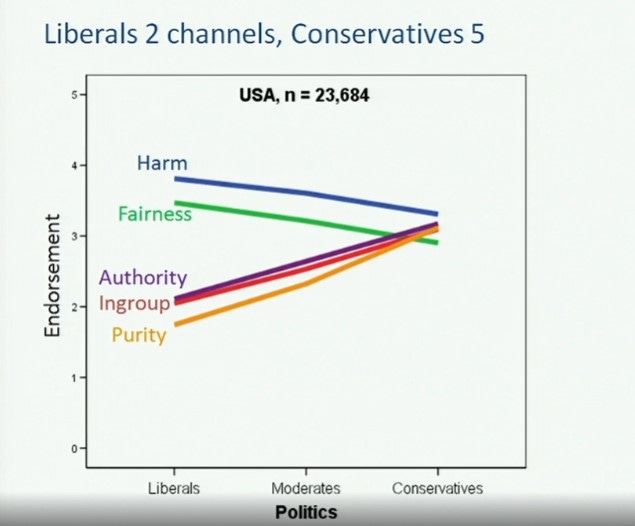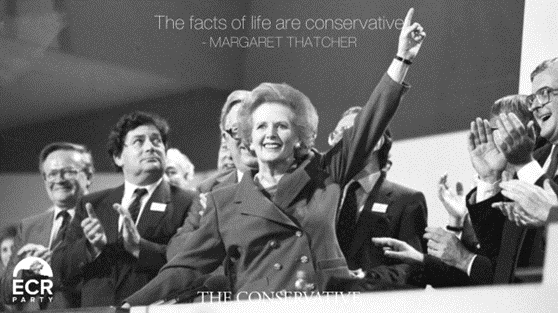Why Most Liberals Are Intellectually Incapable of Understanding Conservatives
They're a bit morally limited
Jonathan Haidt is a center-left social psychologist who has been doing fascinating work on the differences between liberals and conservatives for over a decade (His work on social media is really good as well). Haidt has said publicly that when he started studying the differences between liberals and conservatives, he was just looking for ways to help Democrats get elected, but when he dug into the way both sides saw the world, he realized that he had stumbled on to something much bigger.
This is a very basic explanation of Haidt’s “Moral Foundation Theory” that explains those differences.
It starts with the idea that none of us are born as a blank slate. Not only do we have different genetics (which is uncontroversial), but we have built-in programming that leads us to look at the world a certain way. Like genetics, it’s not an absolute determination, but it predisposes us to look at certain ideas in a more positive or negative light. Initially, there were 5 areas people were measured on (they’ve considered adding others). Here’s how they break it down:
The five foundations for which we think the evidence is best are:
1) Care/harm: This foundation is related to our long evolution as mammals with attachment systems and an ability to feel (and dislike) the pain of others. It underlies virtues of kindness, gentleness, and nurturance.
2) Fairness/cheating: This foundation is related to the evolutionary process of reciprocal altruism. It generates ideas of justice, rights, and autonomy. [Note: In our original conception, Fairness included concerns about equality, which are more strongly endorsed by political liberals. However, as we reformulated the theory in 2011 based on new data, we emphasize proportionality, which is endorsed by everyone, but is more strongly endorsed by conservatives.]
3) Loyalty/betrayal (Ingroup): This foundation is related to our long history as tribal creatures able to form shifting coalitions. It underlies virtues of patriotism and self-sacrifice for the group. It is active anytime people feel that it’s “one for all, and all for one.”
4) Authority/subversion: This foundation was shaped by our long primate history of hierarchical social interactions. It underlies virtues of leadership and followership, including deference to legitimate authority and respect for traditions.
5) Sanctity/degradation (Purity): This foundation was shaped by the psychology of disgust and contamination. It underlies religious notions of striving to live in an elevated, less carnal, more noble way. It underlies the widespread idea that the body is a temple which can be desecrated by immoral activities and contaminants (an idea not unique to religious traditions).
Here’s the really interesting thing about how conservatives and liberals score when they’re tested in these areas. Liberal scores tend to be very high in the first two areas (Care/Harm & Fairness/Cheating), but low in the other areas. On the other hand, conservative scores tend to be roughly comparable across the board, albeit slightly lower than liberal scores on Care/Harm & Fairness/Cheating. Here’s an example of what that looks like from a Jonathan Haidt Ted Talk:
Liberals have a lot of trouble understanding conservatives because conservatives pay a great deal of attention to moral areas that liberals don’t care much about or may even see as a negative. Because of this, liberals have a great deal of trouble intellectually understanding the conservative view of the world. Haidt has discussed this as well:
When I speak to liberal audiences about the three “binding” foundations – Loyalty, Authority, Sanctity – I find that many in the audience don’t just fail to resonate; they actively reject these concerns as immoral. Loyalty to a group shrinks the moral circle; it is the basis of racism and exclusion, they say. Authority is oppression. Sanctity is religious mumbo-jumbo whose only function is to suppress female sexuality and justify homophobia.
In a study I did with Jesse Graham and Brian Nosek, we tested how well liberals and conservatives could understand each other. We asked more than two thousand American visitors to fill out the Moral Foundations Questionnaire. One-third of the time they were asked to fill it out normally, answering as themselves. One-third of the time they were asked to fill it out as they think a “typical liberal” would respond. One-third of the time they were asked to fill it out as a “typical conservative” would respond. This design allowed us to examine the stereotypes that each side held about the other. More important, it allowed us to assess how accurate they were by comparing people’s expectations about “typical” partisans to the actual responses from partisans on the left and the right. Who was best able to pretend to be the other?
The results were clear and consistent. Moderates and conservatives were most accurate in their predictions, whether they were pretending to be liberals or conservatives. Liberals were the least accurate, especially those who described themselves as “very liberal.” The biggest errors in the whole study came when liberals answered the Care and Fairness questions while pretending to be conservatives. When faced with questions such as “One of the worst things a person could do is hurt a defenseless animal” or ”Justice is the most important requirement for a society,” liberals assumed that conservatives would disagree. If you have a moral matrix built primarily on intuitions about care and fairness (as equality), and you listen to the Reagan [i.e., conservative] narrative, what else could you think? Reagan seems completely unconcerned about the welfare of drug addicts, poor people, and gay people. He’s more interested in fighting wars and telling people how to run their sex lives.
A lot of these studies were done a decade ago and after the radical shift we’ve seen on the Left over the last decade, it wouldn’t be a surprise if the numbers were even more skewed. You’re seeing these issues playing out all across the political world.
Why are liberals good with putting children in a room with drag queens while conservatives adamantly oppose it? The difference is how we look at purity. Why will liberals side with criminals, even ones that are obviously in the wrong, against cops? They put a minimal value on authority. Why are conservatives more patriotic than liberals? We put a high value on loyalty to the country, while liberals don’t. How is it that so many liberals are okay with homeless people crapping in the street? Because they feel pity for homeless people to the point where they’re willing to walk through human feces and open-air drug markets while not caring too much about Authority/subversion & Sanctity/degradation. (Side note: I was talking to a friend who moved out of California and that person told me that the homeless people crapping on the street today could be traced back to the plastic bag ban in 2016. Before that, the homeless would crap in those bags and dispose of them. Once that was no longer an option, they started sh*tting on the sidewalk. I had never thought about that, but the timing and reasoning certainly seem to make sense.)
How is it that liberals can believe the most ridiculous lies about conservatives, even when they seem to be plainly and undeniably contradicted by facts? Because not only do they typically not value some of the moral dimensions that conservatives have, but as Haidt notes, they may actually view these concerns as immoral. Patriotism? Put America first? Do you mean like the Germans did with Hitler? Morals? Those are old-timey and all about repression! Arresting shoplifters? They don’t need that on their records and besides, those stores have plenty of stuff! Why should they get to keep it if someone less privileged wants it?
Of course, there are two key practical things to take out of this. First of all, as the late, great Margaret Thatcher said:
They are and when liberals ignore that, there’s a price to be paid. Taxes get too high, and businesses move. Coddle criminals and you’re quickly overrun with crime. An organization that doesn’t require its members to acknowledge authority is going to devolve into chaos and find out why they say, “Get woke, go broke.”
When liberals make these kinds of mistakes, point them out and give them a little credit when they do the right thing. Good for San Francisco for recalling their DA who was essentially an advocate for criminals. People can go against their natural tendencies and learn from their mistakes. Even liberals.
Also, if for whatever reason, you are trying to appeal to liberals, understand that you catch more flies with honey than vinegar. You have a better idea of what they care about and what they don’t, so how can you best use it to craft an argument that may appeal to them? If your argument doesn’t have an emotional hook that focuses on caring for people, reducing harm, or “fairness,” it’s going to fall on deaf ears. Maybe it would anyway since liberals are generally close-minded, but the key idea is to bait the hook with what the fish likes, not what you think they should like. We can’t change the fact that liberals tend to be more limited morally than conservatives, but we can try to adjust to it.




Interesting analysis; it explains something of the division in our nation today. You know what I'm going to say next, right? Leave out God, and authority and purity basically vanish from a person's worldview, and it becomes the Satanic "do what thou will." Like other commentators, my ability to reach progressives is minimal because I want to debate with fact and reason, not feeling and wishful/magical thinking. There are a few things I will try to debate with a progressive, like abortion, where I try to introduce the missing 3rd person, the unborn child. We can talk, somewhat, about their innocence and right to be born- I like to mention laws where a person who kills a pregnant woman can be charged with additional penalties, a legal value for the baby's life that has been ended. Thanks for writing this essay.
Nah, I don't want to appeal to progressives, who are the rank and file of liberals today. I pretty much hate everything they stand for, because what they consider fairness and care is anything but. They are insincere, hypocritical, and morally reprehensible people if they are over the age of 25. Their pathological altruism hurts those they pretend to care about, and they make their families, co-workers and culture miserable. I'm tired of my cohort having to fix the messes they make.